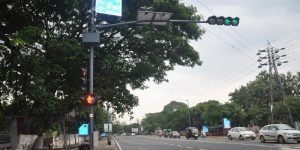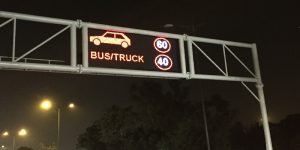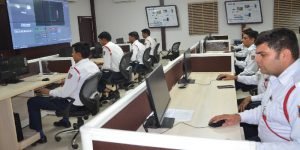
Rasmeet Kohli
Rasmeet Kohli, Managing Director, Envoys Electronics Pvt Ltd, shares with TrafficInfraTech the challenges in providing customised project solutions and how important it is to believe in Make in India
Envoys is a five-decade old company pioneering in the vast spectrum of Road Traffic management and safety solutions: Right from concept to commissioning of Traffic Signalling Systems, Variable Message Signs (VMS), AI based Adaptive Traffic solutions (ATCS), to Tolling / Tunnel Management Display equipment etc. Envoys’ wide product range helps undertake important turnkey projects.
Envoys is in the field of ITMS (Intelligent Traffic Management Systems) as a System Integrator (SI) and as an Original Equipment Manufacturer (OEM) for Traffic Signalling & VaMS. For Urban Traffic Management requirements, We provide complete Turnkey Solution which includes SITC – O&M, Network connectivity, Command & Control Centre, Application Software – Data Centre for ATCS, VMS, Speed Enforcement and Red-light Violation Detection Systems and its integration with e-challan systems.

The year 2015-16 was a turnaround period for Envoys. We emerged as a Turnkey Solution provider for various ITMS, ATCS & VMS Projects – including network connectivity, setting -up of Command & Control Centre with Control Room Application Software solutions for Delhi Traffic Police, Bhubaneshwar Smart City, Jammu Municipal Corporation and Bhopal, Surat & Ujjain city projects.
Recently we did a prestigious project for Delhi Traffic Police for Red-light and over-speeding violation detection & enforcement with E-challan integration, using 3D radar-based Violation Detection, 20 Megapixel front detection ANPR Camera (Single camera for up-to 4 lanes) and IR Illuminator for night-time detection. The over-speeding and RLVD system detects the license plate through its ANPR camera and 3D radar provides Vehicle position and Speed. The detection algorithm captures three best frame pictures along-with six second video of violating vehicle even in low illuminated junctions and extreme Indian climatic conditions.
In Road safety, traffic signals play a major role. How has ITS helped in achieving the best results?
Almost two decades ago in India, the field deployments of traffic management was with isolated systems, without any centralised monitoring / management control. ITS played a vital role for implementation of efficient technology, establishing a network between field equipment and Command & Control Centre. ITS made possible for unmanned Centrally Controlled Coordinated/Adaptive operations, without manual intervention reducing human dependencies and thereby reducing errors. Real time adaptive & Artificial intelligence played vital role for human safety on roads. Non-Intrusive Vehicle detection at junctions provides real time information which is further connected to Command & Control Centre for centralised coordination & optimisation.
ITS made it possible for optimised & effective operations of ITMS implementations – the individual intersections can be remotely configured for synchronised operation with pre-set algorithm for desired functionality. Stored data at Centralised Data Centre for evaluations & analysis makes the Operations & Management more efficient.

Envoys’ products and solutions are indigenised. You advocate “Make in India” solutions, as many of the global products may not exactly suit our traffic conditions and topography. How do you face these challenges? Especially in Smart City projects where the technology provider has to go through multiple screening processes.
I am a firm believer of Make In India. There are many well established Class -I Local Suppliers & Solution providers for AI based products with complete ITMS Solutions & its application software. Indian technology is far more superior & suitable for heterogeneous traffic conditions, typically observed at all major cities in India. Envoys can provide customised solutions & technologies, suitable to specific requirements of different clients/projects in different cities – which is quite a challenge as well.
The varying technical requirements and project specific RFP, pose a huge challenges for solution providers & OEM like us. Above all, this is a direct threat to doing Business in India in spite of working tirelessly to develop new products/solutions to meet future domestic traffic requirements and also upgrading the existing solutions. However, in absence of any India-specific Standards for ITMS, every project becomes a customised project with its unique/specific requirements. There is an immediate need of intervention by Central Govt/Regulatory agencies to freeze the Standards and ensure uniform requirements as per India-specific standards– rather than individual Smart City, Local or overseas OEM based monopolistic technical requirements for ITMS & ATCS. It is high time now that the Bureau of Indian Standards/ITS India Chapter intervenes to ensure strict compliance of India-specific Standards for all ITMS/ATCS projects in India. This Will eliminate monopolistic approach adopted in certain ITMS & Smart City Projects, after getting Influenced by specific overseas OEM, even after having such technologies readily available in India. Key players from Industry / Agency like CDAC, IIT, IRC should come up jointly to save MAKE IN INDIA mission of Government of India.

You have Executed many Project which project U feel is different than conventional Technology in this field:-
We did Adaptive Traffic Signal Control System(ATSC) project for Bhubaneshwar Smart City, which was the first smart city project in India for Adaptive Traffic Control System (ATCS). The biggest challenge in developing Nation like India is involvement of multiple agencies, Utilities & permissions required for digging roads. Challenges faced during HDD for laying cables below ground level which increases probabilities of damaging the existing utility structures – like gas /water pipe-lines, electrical cables etc. To avoid all these issues, We installed traffic signals with 100% solar power at more than 50 junctions and using Wireless technology within the Junction & Wireless VPN(4G) network for establishing Network connectivity between Junction & Control room. Each pole has a solar panel and a battery, with no separate power requirement. This 100% Solar powered Adaptive Traffic Controller System based on CDAC’s patented Wireless Technology, has been working successfully for more than four years now. This innovative System works 24X7 with 4-days backup for operation during No-Sun condition. In developing countries Junction Widening & Improvisation is still an on-going process – the geometry of intersections is constantly evolving. After Signalisation of Intersection & installation there are high probabilities of road widening – With This Technology Road Digging & laying of cables including lengthy process of approvals to lay fresh cable is totally eliminated. For any Pole reallocation, a simple procedure of making Pole foundation at new location is required for shifting of self-powered pole assembly – which further reduces / minimises down time and damages to any utilities. This is a first of its kind – 100% wireless, 100% solar, centrally controlled, Adaptive traffic controller on CDAC technology, suitable for heterogenous Traffic conditions in India
What are your expansion plans and upcoming Projects?
We want to enable automation for our production – fully automated, electronic assembly line, powered by robotics. We want to increase the share of production that we undertake in the assembly line and then automate it. We hope to gain better quality control and have better output. We are in the process of creating a larger fabrication unit which will be integrated with assembly line. High-grade Quality control coupled with automated testing process for real time Environmental Testing, for research & development of high quality indigenous products.
We also are developing in-house climate and aging testing facility, for increased volumes production. At the moment, it is quite a standard process of creating a copy or variation of existing products. We need to create an environment for futuristic requirements where we are innovating and creating advanced technologies that can be the first in the world.
What do you feel are some of the key issues going forward?
If you are making a mobile phone, whoever is making it, has to follow a standard protocol that allows for communication between two different devices. Similarly for traffic signals, Europe- US – Australia, and most developed countries, have their own set of protocols. The manufacturer of the hardware or system integrator of that control room, all work on a country-wide standard operating protocol for Integrations & execution. The Standardisation & Centralisation of technology is required to get away with monopolistic approach.
In India, unfortunately Products/Solutions with proprietary protocols of overseas OEM are allowed which increases the dependencies. There is no centralised corridor and we use different standards across the country. So how does that benefit the Municipal Corporations, city civic planners or police? Hypothetically on a centralised technology, in case one organisation fails to perform, the agency can switch over to another organisation that can maintain the system and replace it as well. But in the current scenario they can’t simply switch over if System fails, they are dependent on the original supplier. Dependencies on OEM / Integrator has reached to a level so that if any supplier/OEM fails or is non-supportive, then the city administration will have to redo all hardware and software that is deployed. This is happening across cities in the country, where the Products manufactured by different OEMs aren’t compatible with each other.
In a country like India, different stake holders need to get on a joint forum and create country wide/Country specific standards for traffic management. Not only in terms of specifications or technical data sheet, but also in terms of protocols to allow them to communicate with each other.
Technology has completely changed and that’s why we need this joint forum of experts. Individual consultants or officers should not decide these standards of our country’s safety, it should be through a central Agency/Regulatory bureau. This then will require, simply replication of standard BILL OF MATERIAL as per the city specific demands for 50 or 100 or 500 locations. This will simplify the process drastically – Set the India-specific standards, review Improvise and then adopt and implement required technology, strictly based on India-specific standards.
Interviewed by Sid Jalan
 TrafficInfraTech Magazine Linking People Places & Progress
TrafficInfraTech Magazine Linking People Places & Progress